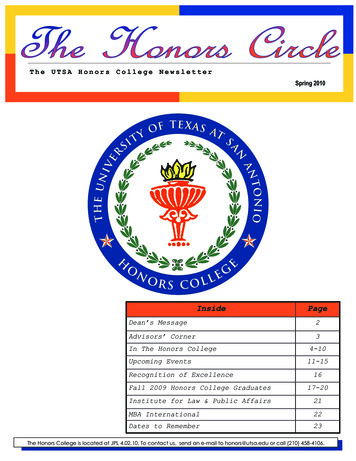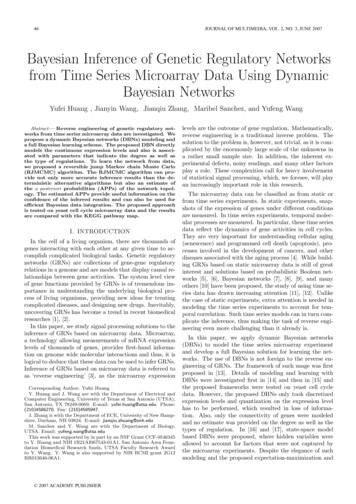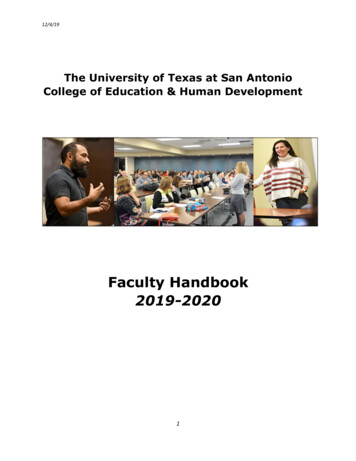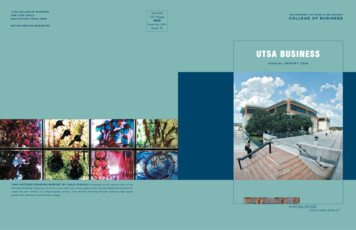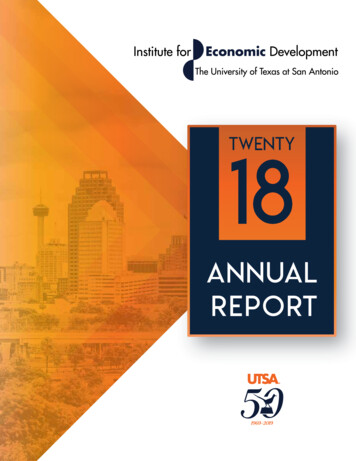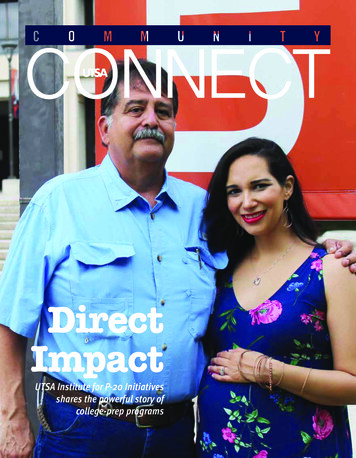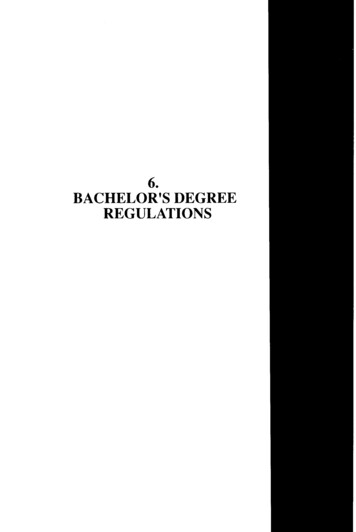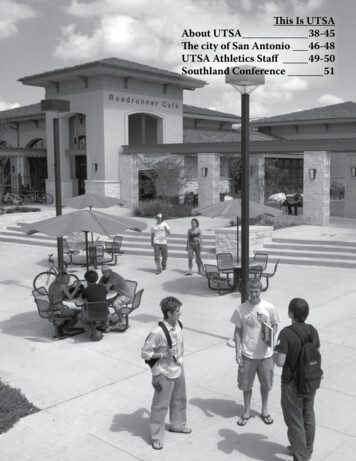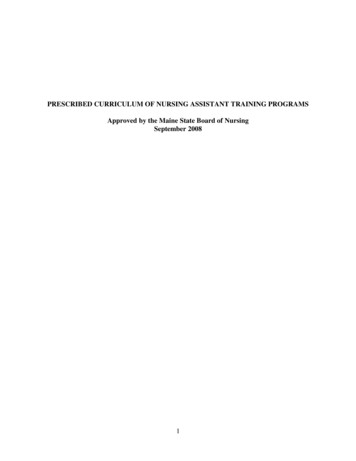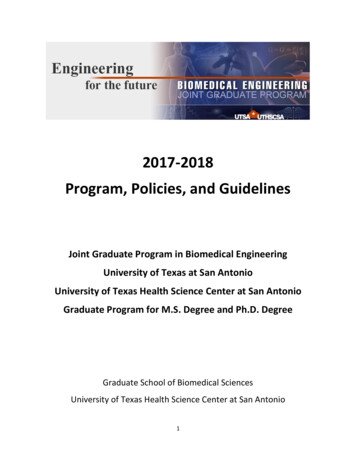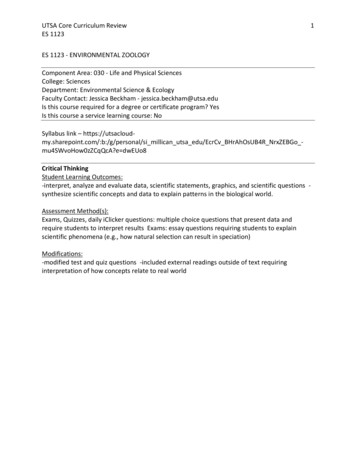
Transcription
UTSA Core Curriculum ReviewES 1123ES 1123 - ENVIRONMENTAL ZOOLOGYComponent Area: 030 - Life and Physical SciencesCollege: SciencesDepartment: Environmental Science & EcologyFaculty Contact: Jessica Beckham - jessica.beckham@utsa.eduIs this course required for a degree or certificate program? YesIs this course a service learning course: NoSyllabus link – si millican utsa edu/EcrCv BHrAhOsUB4R NrxZEBGo mu4SWvoHow0zZCqQcA?e dwEUo8Critical ThinkingStudent Learning Outcomes:-interpret, analyze and evaluate data, scientific statements, graphics, and scientific questions synthesize scientific concepts and data to explain patterns in the biological world.Assessment Method(s):Exams, Quizzes, daily iClicker questions: multiple choice questions that present data andrequire students to interpret results Exams: essay questions requiring students to explainscientific phenomena (e.g., how natural selection can result in speciation)Modifications:-modified test and quiz questions -included external readings outside of text requiringinterpretation of how concepts relate to real world1
UTSA Core Curriculum ReviewES 11232Communication Skills (Written)Student Learning Outcomes:Communicate effectively through written communication in a scientific setting.Assessment Method(s):-essay questions on exams -literature review for final projectModifications:-modified exam questions to be clearer on expectations -included tutorials on writing literaturereviews -links in Blackboard course to tutorials on scientific writingCommunication Skills (Oral)Student Learning Outcomes:Use oral communication to communicate effectively in a scientific setting.Assessment Method(s):Final oral presentation over endangered animal species wherein students present a powerpointover their selected topic with their team.Modifications:The final presentation previously was a single grade. Now we begin introducing the projecthalfway through the semester, with two due dates ahead of the final project due date. Theseare a topic identification assignment, and a literature review. These milestones help thestudents to build a stronger final presentation.Communication Skills (Visual)Student Learning Outcomes:See above.Assessment Method(s):See above.Modifications:See above.Empirical & Quantitative SkillsStudent Learning Outcomes:-creating and interpreting graphs and tables -manipulation and analysis of numerical data make predictions and inferences based on data.Assessment Method(s):-quiz and exam questions -in-class iClicker questions -in-class case studies where data areinterpreted; questions asked
UTSA Core Curriculum ReviewES 1123Modifications:-more emphasis in lecture has been placed on understanding probability and Punnett squares;half a class is used for practice problems where students are able to confer with instructor onany confusing details -when data are presented in class, extra time is taken to explain figures,etc. -exam questions modified as needed for clarityTeamworkStudent Learning Outcomes:-work effectively as members of a team -work with fellow students on assignments, includingin-class discussion, team activities, quizzes, and final presentationAssessment Method(s):-teamwork evaluations after in-class activities and for final presentation -team quizzes followindividual quizzes and student grades are a combination of the two scoresModifications:-team quizzes were implemented to increase learning and collaboration in team setting -moreteam discussion questions included in lectures3
ES 1123 - Environmental Zoology (Q)Instructor: Dr. Jessica BeckhamOffice: FLN 1.01.02COffice Hours: 11 AM – 11:50 MWOffice phone: 210-845-8292Email: Jessica.Beckham@utsa.eduCourse Description: Environmental Zoology - 3 credit hours.An introduction to basic concepts in biology through study of the major lineages of invertebrate and vertebrateanimals, with emphasis on the structure, and function of organ systems in an evolutionary context. Topics coveredwill include basic cell structure and function, genetics, systematics, evolution, animal groups, and selected bodysystems. Functional interactions with their environment and with humans will also be studied.Course Objectives:ES 1123 is a Core Curriculum Course and a “Q” Course that satisfies UTSA’s quantitative scholarship requirement. Asa student you will have the opportunity to develop core skills, including:Critical Thinking Skills: interpret, analyze and evaluate data, scientific statements, graphics, and scientific questions;synthesize scientific concepts and data to explain patterns in the biological world.Communication Skills: oral, visual, and written communication skills.Quantitative Skills: creating and interpreting graphs and tables; manipulation and analysis of numerical data; makepredictions and inferences based on data.Teamwork Skills: work with fellow students on assignments, including in-class discussions and team activities.In addition, successful students will:1. Understand eukaryotic cell structure and function, including cellular metabolism, protein synthesis,and cell division2. Use the general principles of genetics to explain the nature of heredity3. Describe the theory of evolution by natural selection.4. Interpret phylogenetic trees.5. Describe characteristics of selected invertebrate and vertebrate taxa.6. Understand the characteristics of animal digestive, circulatory, respiratory, nervous, and reproductivesystems.7. Work effectively as members of a team.8. Communicate effectively in a scientific setting.9. Engage in citizen science by contributing observations of animals in the natural world.Required Resources:-iClickers –These may be purchased or rented through the bookstore and used for any and all classes that require them. Alimited number of iClickers are available to be checked out from the university library. Your iClicker must beregistered as soon as possible. *** Please register your iclicker through Blackboard in your ES1123 class. ***Instructions for doing this are located in Blackboard on the left-hand menu of the landing page.-Textbooks –
1) required: Integrated Principles of Zoology; Hickman, 17th ed.2) supplemental: Biology 2E by OpenStax (free online text / download available athttps://openstax.org/details/books/biology-2e ; hard copy may also be purchased)Methods of Evaluation and Contributions to Final Grade:1) Exams – 40%There will be four traditional exams (10% each) for a total of 40% of your grade. There will be no cumulative finalexam in this class.2) Quizzes – 15%Quizzes will cover material from the assigned reading and material presented in lecture since the last exam. Eachquiz grade will be taken both individually using the iClicker AND as a team. Your quiz grade will be an average ofyour individual and team grade. There will be six quizzes, but your lowest quiz grade will be dropped.3) Daily Assignments - 15%Homework assignments and in-class team-based assignments. Some of the daily assignments will requirestudents to participate in a series of cooperative learning (team-based) and active learning exercises. Out-ofclass preparation may be required to complete some in-class activities. Daily assignments may be given on anyday. You must be present in class to receive credit for daily assignments.4) Daily iClicker – 10%iClicker questions will be used throughout lectures to check for understanding. Each question will have a total of5 possible points: 2 points for submitting an answer, and 3 additional points for the correct answer. You musthave your iClicker and use it in class to receive iClicker points. No handwritten answers will be accepted!!5) iNaturalist Project – 10%This project will involve you observing animals in the world around you and contributing those observations to theiNaturalist citizen science platform. We will discuss this in detail during the first week of the course.6) Final Group Presentation – 10%During the scheduled final exam, student teams will each give a short presentation (via Powerpoint) to the classon an animal species of their choice. More information on this project will be discussed later in the semester,and will be available on Blackboard in the “Content” “Final Group Presentation” folder in Blackboard.Your project topic is due Nov 7 (TR sections) / Nov 8 (MWF sections)Your project literature review and outline is due Nov 26 (TR sections) / Nov 27 (MWF sections)Your final presentation will take place during your scheduled final exam:1123.001: Tues 12/10, 9:45am-12:15pm1123.003: Tues 12/10, 7-9:30 am1123.004: Fri 12/13, 12:30-3pmPolicy on Extra Credit Points: No extra credit assignments will be given for this class. At my discretion I may offerbonus questions on exams.A final letter grade for the course will be assigned according to the schedule below. Based on Environmental Scienceprogram policy no ( ) or (–) letter grades will be assigned.100-90% (A); 89-80% (B); 79-70% (C); 69-60% (D); less than 60% (F)
Incomplete*: The grade of ‘IN’ (Incomplete) will only be assigned under the following circumstances:1) the student has been in attendance for at least 75% of the semester,2) the student has a satisfactory grade ( 60%),3) there are verifiable, extenuating circumstances that make it impossible for the student to complete theremainder of the course.Do not request a grade of ‘IN’ unless you meet all of the above requirements.Exams:1. Regularly scheduled exams will be objective (multiple choice) and essay type. You will need a ParScore TestForm No. X-101864-PAR-L (red) for exams.2. If an exam is not taken, a zero will be recorded for that exam and averaged in with your other exam grades inthe calculation of your final grade.3. Make-up exams are only available to those students with an excused absence. Sickness with a doctor’s excuse,death in the family with documentation, a court date with documentation, auto accident on route to class withdocumentation, emergency military service with documentation, official university business withdocumentation, or religious holy days will be the ONLY reasons acceptable for taking a make-up exam. Inaccordance with university policy a student is responsible for requesting an excused absence in writing,providing satisfactory evidence to the instructor to substantiate the excused absence and delivering the requestpersonally to the instructor. Notification must take place no later than five school days before the absenceunless such advance notice is not possible, in which case the student must provide notice by the end of thethird school day after the absence along with an explanation of why notice could not be sent prior to theabsence. Make-up exams will be administered only after verification of an excused absence. All make-up examswill be subjective/essay type exams. Make-up exams will not be given for conflicting work or travel schedules,weddings, multiple exams on a single day, or students who do not feel prepared to take an exam.Policy on Attendance and Late Assignments:1. Attendance is required. If you are absent, you are responsible for any and all material covered in class on theday of the absence. Missed daily assignments and iClicker points cannot be made up.2. Sickness with a doctor’s excuse, death in the family with documentation, a court date with documentation,auto accident on route to class with documentation, emergency military service with documentation, officialuniversity business with documentation, or religious holy days will be the ONLY reasons acceptable formaking up a quiz.3. If an assignment is not completed, a zero will be recorded for that assignment and averaged in with yourother scores to obtain a final grade.Disability Statement: Instructional support services, including registration assistance and equipment, are availableto students with documented disabilities through the Office of Disabled Services (DSS), MS 3.01.13. You may contactDSS at 458-4157 to make arrangements for these services.Policy on Plagiarism and Collusion:All work must be original and done independently. If work is not original and independent, the student will receive azero on the assignment and be reported to the appropriate offices on campus for disciplinary steps. All studentsare responsible for reading and understanding the student code of conduct presented on the UTSA web page(http://utsa.edu/infoguide/appendices/b.html). See below for more information.
Scholastic Dishonesty:The integrity of a university degree depends on the integrity of the work done for that degree by each student.The University expects a student to maintain a high standard of individual honor in all scholastic work (Rulesand Regulations of the Board of Regents, Chapter VI, 3.(22)).If a student is accused of academic dishonesty, the faculty member may initiate disciplinary proceedingsthrough the Department Chair, the Dean of the college, and the Student Judicial Affairs Coordinator.a. The Dean or a faculty member may initiate disciplinary proceedings under Sections 203 and 303, StudentCode of Conduct against a student accused of scholastic dishonesty.b. "Scholastic dishonesty" includes, but is not limited to, cheating, plagiarism, collusion, falsifying academicrecords, and any act designed to give unfair academic advantage to the student (such as, but not limited to,submission of essentially the same written assignment for two courses without the prior permission of theinstructor, providing false or misleading information in an effort to receive a postponement or an extension ona test, quiz, or other assignment), or the attempt to commit such an act.More information on activities that constitute scholastic dishonesty can be found ndices/studentcodeofconduct/ .One of my obligations as a faculty member is to do my best to assure that the performance of students isevaluated fairly and that all students are treated similarly. Acts of scholastic dishonesty are inconsistentwith both and will be dealt with severely.Classroom Behavior:Civility and non-disruptive behavior are expected of all students in the classroom. Disruptive behavior is classifiedas any behavior that disturbs either the instructor or fellow students. Students displaying non-civil or disruptivebehavior will be asked to discontinue the behavior. If a student continues the behavior he/she will be asked to leavethe classroom. Leaving the classroom as a result of non-civil or disruptive behavior will be considered an unexcusedabsence. Examples of non-civil or disruptive behavior include but are not limited to the following: texting, reading email, or surfing the internet on laptops, tablets, or cellular phones ringing of cellular phones (please set to silent mode or turn off before class begins) tardiness or leaving class early making offensive remarks prolonged chattering reading newspapers or text books for other courses wearing headphones/earbuds during lecture sleeping overt inattentivenessChanges:This syllabus is provided for informational purposes regarding anticipated course content and schedule of courses. Itis based upon the most recent information available on the date of its issuance and is as accurate and complete aspossible. I reserve the right to make any changes necessary and/or appropriate. I will make every effort tocommunicate any changes in a timely manner. Students are responsible for the awareness of these changes.
Tentative Topics Schedule - Fall 2019 Environmental Zoology (TR)UnitDate TopicPrior Reading (H Hickmantext; OS openstax text) /Associated AssignmentsSyllabus & Class Expectations; Team27- Assignments; Properties of Life; begin AnimalAug CellsH Ch 1 (2-9); OS 1.229- Team Activity: iNaturalist training andAug campus Bioblitz1 iNat observation due by11:59 pmAnimal Cells; Intro to Metabolism and3-Sep EnzymesH Ch 2 (31-33); H Ch 3 (3842); H Ch 4 (55-60); OS 4.34.4; OS 6Energy Production in Cells (Fermentation and5-Sep Cellular Respiration)H Ch 4 (60-67) ; OS 710- Energy Production (continued); Team Activity:Sep Cancer Cell MetabolismUnit 1 Introductionto LivingAnimals12Sep DNA Structure and Replication17Sep Cell Cycle and Mitosis (continued)Quiz 1; H Ch 3 (49-53); OS14.1-14.519Sep Test 124Sep Meiosis; Introduction to Genetics10 iNat observations due9/20 11:59 pm26Sep1-Oct3-Oct8-OctUnit 2 Continuityand Evolutionof Animal LifeIntroduction to Genetics (continued); TeamGenetics PracticeProtein SynthesisProtein Synthesis; Begin EvolutionIntroduction to Evolution10- Evolution (continued); Team Clicker Case:Oct Sneaky Salmon15Oct Taxonomy, PhylogenyH Ch 5 (71-85); OS 11, OS 12Quiz 2; H Ch 5 (85-96); OS 15H Ch 6 (99-130); OS 18-19Quiz 3H Ch 10 (197-214); OS 2017Oct Test 210 iNat observations due10/17 11:59 pm22Oct Porifera, CnidariaH Ch 12 (246-257); H Ch 13(260-282)24Oct Mollusca, Arthropoda, Echinodermata29Oct FishesUnit 3 Diversity ofAnimal LifeOS 10.1-10.4H Ch 16 (332-358); H Ch 19(402-416); H Ch 20 (421440); H Ch 21 (443-467); HCh 22 (471-489)H Ch 24 (516-541); Quiz 431- Fishes (continued); Team Clicker Case Oct Strange Fish5-Nov Amphibia; ReptiliaH Ch 25 (543-560); H Ch 26(563-582)
7-Nov Aves; Mammalia12Nov Test 314Nov Integument, Skeletal, Muscular systems19- Excretory System (Homeostasis: OsmoticNov Regulation & Excretion)21Nov Digestive System26Nov Team Activity - Fad Diets28Nov Thanksgiving Holiday - no classesUnit 4 Activity ofAnimal LifeCirculatory & Respiratory Systems3-Dec (Homeostasis: Circulation & Respiration)5-Dec Test 46-Dec Student Study Day - no classesFinal Presentation during scheduled finalDec 7- 13Quiz 5; H Ch 27 (584-608); HCh 28 (610-637);Presentation topic due10 iNat observations due11/12 11:59 pmH Ch 29 (639-658)H Ch 30 (660-678)H Ch 32 (702-717);Quiz 6; PresentationLiterature Review andOutline DueH Ch 31 (680-700)10 iNat observations due12/5 11:59 pm1123.001 : Tues 12/10, 9:45am-12:15pmDrop Date: Monday October 28 – Undergraduates: Last day to drop a class with an automatic “W”.Students are not automatically dropped from a class if they stop attending the class.
Undergraduate Studies2/4/2020Professor Beckham,The Core Curriculum Committee recently completed its periodic review of ES 1123 - ENVIRONMENTALZOOLOGY as per the guidelines outlined on the UTSA Core Curriculum website. The overallrecommendation by the committee members for this course is:Recommend to remain in the UTSA Core CurriculumRevisions recommended to remain in the UTSA Core CurriculumSubstantive revisions required to remain in the UTSA Core CurricumRecommend removal from the UTSA Core CurriculumThe committee was very impressed overall with the materials that were submitted. While there weresome minor suggestions to modify the assessment methods and how you use these results, thecommittee would love to use this as an example for others as they prepare for future reviews.On the next page, you should find summary comments from the committee on the availability of ES 1123as well as comments related to the syllabus and information that you submitted through the review portalprior to November 1. There may be recommendations for follow-up at the end of the document.I'd like to extend the invitation to visit with me personally if I can be of any assistance or provide you withmore detailed information about the review process or the Committee's findings. Our office is here toassist you in any way.If you have not already done so, I would also encourage you to consult the course design and assessmentresources found on the Core Curriculum Resource Page found on the Teaching and Learning Serviceswebsite. This site can be accessed at ge.Sincerely,Dr. Si MillicanAssociate Vice Provost - Undergraduate StudiesProfessor of Music EducationCC:Kristi Johnson, Management Analyst - University CollegeJanis Bush, Chair - Environmental Science and EcologyOne UTSA Circle San Antonio, Texas 78249-0645 (210) 458-5191(210) 458-5189 fax
Course prefix and title: ES 1123 - ENVIRONMENTAL ZOOLOGYPoint of contact: Jessica BeckhamThe course is offered regularly: YesComments on course availability: Consider offering as a summer course if student demand supports this.SYLLABUS COMMENTSThe committee was very impressed with this submission, and would like to use it as a model for otherswith your permission.MODIFICATIONS COMMENTS (submitted via online portal)Student Learning Outcomes:Well defined student learning outcomes related to the state-required objectives.Assessment:Many of the outcomes are assessed using "investigation and discussion." It was unclear how instructorsmight complete and/or document this assessment.Changes or Modifications Implemented:It was not always clear how the changes that were made related to the collected assessment data.Follow Up Actions:Thank you for your submission. Please let me know if you would like to visit about other ways to assessand document the achievement of the learning outcomes for this course. Let me know if we havepermission to share this packet with our peers across the university as an example.
Email: Jessica.Beckham@utsa.edu Course Description: Environmental Zoology - 3 credit hours. An introduction to basic concepts in biology through study of the major lineages of invertebrate and vertebrate animals, with emphasis on the structure, and function of
